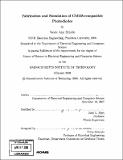Fabrication and simulation of CMOS-compatible photodiodes
Author(s)
DiLello, Nicole Ann
DownloadFull printable version (20.59Mb)
Other Contributors
Massachusetts Institute of Technology. Dept. of Electrical Engineering and Computer Science.
Advisor
Judy L. Hoyt.
Terms of use
Metadata
Show full item recordAbstract
CMOS-compatible photodiodes are becoming increasinging important devices to study because of their application in combined electronic-photonic systems. They are already used as inexpensive optical transceivers in fiber optic telecommunications systems and they have the potential to be integrated in a number of applications. This thesis focuses on germanium photodiodes to be used in an integrated electronic-photonic analog-to-digital converter. It specifically studies the dark current, responsivity, and frequency response of Ge-on-Si LPCVD-grown diodes that will be used in such a system. It outlines a process that can be used to add metal contacts to pre-existing diodes and discusses characterization procedure. It was found that previously fabricated 50 pm square diodes had leakage current of 0.25 uA at -1 V, but responsivity of -5 mA/W. Diodes with higher leakage current, 1.1 piA at -1 V, had a higher responsivity of -0.5 A/W. Spreading resistance profiles (SRP) indicate that better control of the n-type contact is needed to systematically reproduce these results. Furthermore, spreading resistance analysis demonstrated that elimination of the p-type seed during growth will result in a more abrupt junction, for which simulations predict an improved frequency response. Simulations indicate that removal of the p-type seed and associated autodoping should increase the frequency response from -1.6 GHz to 1-4 GHz. Better control of the n-type profile can further increase the frequency response from '14 GHz to -27 GHz.
Description
Thesis (S.M.)--Massachusetts Institute of Technology, Dept. of Electrical Engineering and Computer Science, 2008. Includes bibliographical references (p. 65-67).
Date issued
2008Department
Massachusetts Institute of Technology. Department of Electrical Engineering and Computer SciencePublisher
Massachusetts Institute of Technology
Keywords
Electrical Engineering and Computer Science.